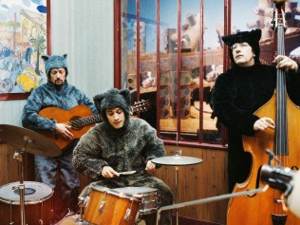Sleepy Science

Whenever I try to write about a current movie for this site, I always procrastinate and then post something a couple weeks after the movie is in theaters. That pretty much renders the review even more obsolete than it already is by virtue of only existing in some small-known corner of the uselessly vast intra-net. However, I think there is one guy from England who reads this blog regularly. I don’t know if he reads my movie shit, but regardless, this 2 week late review of The Science of Sleep is for him/her. Rue Britannia!
First off, if you are even considering seeing Michel Gondry (the French guy who did Eternal Sunshine of the Spotless Mind, and all those baddass music videos like the one where The White Stripes are legos)’s new flick, do it. Go now. On the big screen this film is absolutely stunning visually, and it will lose a shitload when reduced to a TV screen. It’s fantastical stop-motion special effects and exquisitely detailed surreal sets continue this artistic return to analogue culture which seems to be happening throughout the suffocatingly technical western world. Such analog concerns can be witnessed from the interest in hand processing and found footage in the experimental film circuit to the trendy necessity of selling junky LPs in every used cd shop. But I don’t think there are any high profile filmmakers out there now who indulge in this anti-digital hand crafted world as sincerely or effectively as Gondry (Terry Gilliam maybe? - although he incorporates CGI work into all his films, but with a masterful and subtle balance). What comes through more than anything else in this film is Gondry’s childlike love of the magical effects of cinema, the sublime moments of illusion created by in-camera optical trickery (rather than slick computerized post-production). In this, I think he draws a lot from Jean Cocteau, the French master who pretty much set the standard for Romantic magic in film. By using photographic effects (like frame by frame animation, super impositions, and shooting his crazy mobile sets live) instead of CGI animation, Gondry’s impossible images become tangible, which gives them a psychological weight and power that, in my opinion, is impossible with slick and hollow computer animation. The power of movies comes from their photographic illusion of motion, the fact that they have, for the last 111 years, continued to fool our brains. All special effects which extend from this photographic process will necessarily have a stronger power over our brains and eyes than those conjured from insubstantial computer code. I think this is proven by the continual power of films like Cocteau’s Blood of a Poet, which although it utilizes photographic effects established long ago, still looks wonderfully real because it shows us an impossible world build from concrete elements, unlike the weightless digital effects of most shit now.
Although the fantastic vision of the film is enough to justify the 8 bucks for a ticket, the rest of it is good too. The acting is great, especially Gail Garcia Bernal who as far as I know has yet to do a bad job and who’s rapidly becoming the darling of the international indie film world (once Almodovar uses you in a movie, you’re fucking legit). And he’s not hard on the eyes either. The film also has a fluid structure which mirrors the dreamy imagery and serves as a nice meeting point for fantasy and reality to overlap. When talking about a weird French movie about dreams, it’s hard not to compare it to flicks by Luis Bunuel or David Lynch, especially Bunuel’s Belle De Jour which attempts to bring dream and reality closer and closer together until they are ambiguously united in the final shot (it’s also his worst movie, fuck that movie). However, since Gondry doesn’t approach dream movies from the more analytic or heavy-handed intents as Lynch or the early surrealists did, it has a sweetness and subtly too it that really makes it something special. Rather than trying to deconstruct the subconscious or show its dark side, it merely revels (sometimes painfully) in the beauty, power and freedom of dreaming and in resisting the strict notions of reality imposed on children by the up tight adult social world. Definitely a movie worth checking out.
Here are a couple of great surreal songs that I think do a good job of merging the normal world with the dream one.
The Pickup Bear - Deerhoof
Deerhoof is one big fucking dreamy freakout. They are hard to define but awesome to listen to. Apparently their guitarist quit to further his own band, The Curtains, who I know nothing about. Too bad. But the remaining members are still spazing out and pushing the limits of pop. This is off The Man, The King, The Girl, which I think is one of their best albums (second only to Reveille).
Octopus - Syd Barrett
What can you say about Syd. Nothing, because anything you could say would insult his genius. The world is a fundamentally shittier place without him.


1 Comments:
ray-ban sunglasses
toms outlet
fitflop sale
tiffany and co
nhl jerseys
ray ban,rayban,occhiali ray ban,ray-ban,ray ban occhiali,ray ban sunglasses
nike free
coach outlet
mulberry bags
michael kors outlet
thomas sabo outlet
fitflops clearance
cheap uggs
coach outlet online
tiffany and co
nfl jerseys
michael kors uk outlet
oakley sunglasses sale
coach factory outlet
michael kors uk outlet
1216
Post a Comment
<< Home